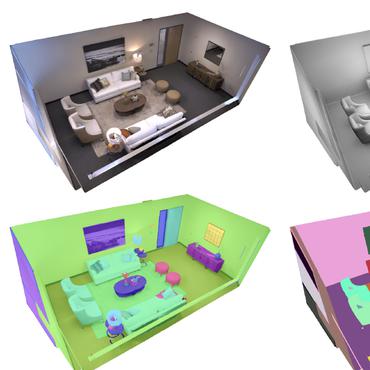Search Results for author: Qi Shan
Found 17 papers, 9 papers with code
Talaria: Interactively Optimizing Machine Learning Models for Efficient Inference
no code implementations • 3 Apr 2024 • Fred Hohman, Chaoqun Wang, Jinmook Lee, Jochen Görtler, Dominik Moritz, Jeffrey P Bigham, Zhile Ren, Cecile Foret, Qi Shan, Xiaoyi Zhang
On-device machine learning (ML) moves computation from the cloud to personal devices, protecting user privacy and enabling intelligent user experiences.
StableDreamer: Taming Noisy Score Distillation Sampling for Text-to-3D
no code implementations • 2 Dec 2023 • Pengsheng Guo, Hans Hao, Adam Caccavale, Zhongzheng Ren, Edward Zhang, Qi Shan, Aditya Sankar, Alexander G. Schwing, Alex Colburn, Fangchang Ma
Our analysis identifies the core of these challenges as the interaction among noise levels in the 2D diffusion process, the architecture of the diffusion network, and the 3D model representation.
UPSCALE: Unconstrained Channel Pruning
1 code implementation • 17 Jul 2023 • Alvin Wan, Hanxiang Hao, Kaushik Patnaik, Yueyang Xu, Omer Hadad, David Güera, Zhile Ren, Qi Shan
However, for multi-branch segments of a model, channel removal can introduce inference-time memory copies.
HyperDiffusion: Generating Implicit Neural Fields with Weight-Space Diffusion
1 code implementation • ICCV 2023 • Ziya Erkoç, Fangchang Ma, Qi Shan, Matthias Nießner, Angela Dai
HyperDiffusion operates directly on MLP weights and generates new neural implicit fields encoded by synthesized MLP parameters.
PointConvFormer: Revenge of the Point-based Convolution
no code implementations • CVPR 2023 • Wenxuan Wu, Li Fuxin, Qi Shan
Hence, we preserved the invariances from point convolution, whereas attention helps to select relevant points in the neighborhood for convolution.
FvOR: Robust Joint Shape and Pose Optimization for Few-view Object Reconstruction
1 code implementation • CVPR 2022 • Zhenpei Yang, Zhile Ren, Miguel Angel Bautista, Zaiwei Zhang, Qi Shan, QiXing Huang
In this paper, we present FvOR, a learning-based object reconstruction method that predicts accurate 3D models given a few images with noisy input poses.
Texturify: Generating Textures on 3D Shape Surfaces
no code implementations • 5 Apr 2022 • Yawar Siddiqui, Justus Thies, Fangchang Ma, Qi Shan, Matthias Nießner, Angela Dai
Texture cues on 3D objects are key to compelling visual representations, with the possibility to create high visual fidelity with inherent spatial consistency across different views.
Fast and Explicit Neural View Synthesis
no code implementations • 12 Jul 2021 • Pengsheng Guo, Miguel Angel Bautista, Alex Colburn, Liang Yang, Daniel Ulbricht, Joshua M. Susskind, Qi Shan
We study the problem of novel view synthesis from sparse source observations of a scene comprised of 3D objects.
MVS2D: Efficient Multi-view Stereo via Attention-Driven 2D Convolutions
1 code implementation • CVPR 2022 • Zhenpei Yang, Zhile Ren, Qi Shan, QiXing Huang
Deep learning has made significant impacts on multi-view stereo systems.
RetrievalFuse: Neural 3D Scene Reconstruction with a Database
1 code implementation • ICCV 2021 • Yawar Siddiqui, Justus Thies, Fangchang Ma, Qi Shan, Matthias Nießner, Angela Dai
3D reconstruction of large scenes is a challenging problem due to the high-complexity nature of the solution space, in particular for generative neural networks.
Equivariant Neural Rendering
1 code implementation • ICML 2020 • Emilien Dupont, Miguel Angel Bautista, Alex Colburn, Aditya Sankar, Carlos Guestrin, Josh Susskind, Qi Shan
We propose a framework for learning neural scene representations directly from images, without 3D supervision.
Manhattan Room Layout Reconstruction from a Single 360 image: A Comparative Study of State-of-the-art Methods
3 code implementations • 9 Oct 2019 • Chuhang Zou, Jheng-Wei Su, Chi-Han Peng, Alex Colburn, Qi Shan, Peter Wonka, Hung-Kuo Chu, Derek Hoiem
Recent approaches for predicting layouts from 360 panoramas produce excellent results.
LayoutNet: Reconstructing the 3D Room Layout from a Single RGB Image
2 code implementations • CVPR 2018 • Chuhang Zou, Alex Colburn, Qi Shan, Derek Hoiem
We propose an algorithm to predict room layout from a single image that generalizes across panoramas and perspective images, cuboid layouts and more general layouts (e. g. L-shape room).
RIDI: Robust IMU Double Integration
1 code implementation • ECCV 2018 • Hang Yan, Qi Shan, Yasutaka Furukawa
This paper proposes a novel data-driven approach for inertial navigation, which learns to estimate trajectories of natural human motions just from an inertial measurement unit (IMU) in every smartphone.
Panoramic Structure from Motion via Geometric Relationship Detection
no code implementations • 5 Dec 2016 • Satoshi Ikehata, Ivaylo Boyadzhiev, Qi Shan, Yasutaka Furukawa
This paper addresses the problem of Structure from Motion (SfM) for indoor panoramic image streams, extremely challenging even for the state-of-the-art due to the lack of textures and minimal parallax.
IM2CAD
no code implementations • CVPR 2017 • Hamid Izadinia, Qi Shan, Steven M. Seitz
Given a single photo of a room and a large database of furniture CAD models, our goal is to reconstruct a scene that is as similar as possible to the scene depicted in the photograph, and composed of objects drawn from the database.
Occluding Contours for Multi-View Stereo
no code implementations • CVPR 2014 • Qi Shan, Brian Curless, Yasutaka Furukawa, Carlos Hernandez, Steven M. Seitz
The proposed approach outperforms state of the art MVS techniques for challenging Internet datasets, yielding dramatic quality improvements both around object contours and in surface detail.








